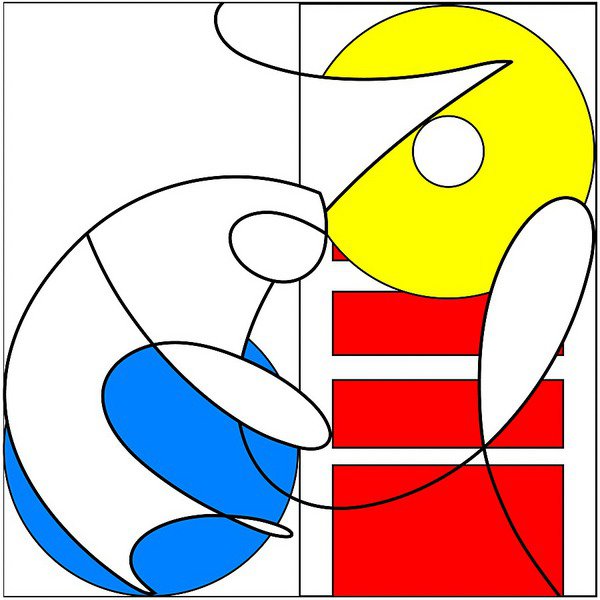Adi Da Samraj
dal 7/9/2011 al 7/10/2011
Segnalato da
7/9/2011
Adi Da Samraj
Sundaram Tagore Gallery, Beverly Hills
Orpheus and Linead. This exhibition comprises 7 works on aluminum. Each image is a geometric abstraction composed of the three primary colors and black and white. Curated by Achille Bonito Oliva.

curated by Achille Bonito Oliva
Beverly Hills, August 8, 2011—Adi Da Samraj is known for his monumental works meant to draw viewers into
an ecstatic experience and connect them to a higher spiritual truth. Since his participation in the 2007 Venice
Biennale, the late American-born artist has commanded a large international following. This exhibition, called
Orpheus and Linead, curated by the renowned Italian critic and art historian Achille Bonito Oliva (director of
the 45th Venice Biennale), comprises 7 works on aluminum. Each image is a geometric abstraction composed
of the three primary colors and black and white. The exhibition premiered in September 2010 at Sundaram
Tagore Gallery in New York.
Adi Da (1939-2008) graduated from Columbia University in New York in 1961 with a BA in philosophy and
from Stanford University in 1966 with an MA in literature. His thesis was on modernism, Gertrude Stein, and
painters of the same period. He began making art in the early 1960s, in the form of photography and calligraphic
brush painting. In the last decade of his career, he worked to move beyond the single-point perspective
that dominates the canon of Western art. By transcending single-point perspective, which he equated with
egocentricism, he sought to invite viewers into a space devoid of ego. Curator Achille Bonito Oliva explains:
“ The abstraction of Adi Da Samraj is anti-rhetorical and aspires to restore humanity to a state of contemplation
and reflection....His abstract images look upon the world from beyond any point of view.”
(continued)
Over the course of his artistic career, Adi Da embraced technology, which he valued for the precision, aesthetic
freedom, and non-painterliness it allowed. For this body of work, Adi Da began by photographing a chair, a
bicycle, and a bird in flight. He then made digital compositions of geometric shapes inspired by his photographs.
Once completed, the first drawing served as the basis for the next work as he sought to progressively abstract
his images. Thus each subsequent image was a further distillation of the previous one.
Adi Da’s digital drawings were informed by a complex vocabulary of forms, colors, and spiritual concepts. He
used two major visual elements in each work, which he called lineads and geomes. Lineads are hand-drawn
gestural marks and curvilinear lines; geomes are solid geometric shapes. There is a momentum that takes place
as the lineads uncoil upon the harmoniously positioned blocks of colors or the geomes. Together these forms
unite to create a sense of dynamism and movement within the drawings.
In the final stage of Adi Da’s unique process, the drawings were sent to a top fabrication studio to be transformed,
in a painstaking and elaborate process, into large-scale works composed of lacquer pigment on aluminum.
Orpheus and Linead is accompanied by a catalogue, which includes an essay by Achille Bonito Oliva.
About the artist
In addition to being an artist, Adi Da was a spiritual leader and prolific author on spiritual subjects. His work
has been shown widely in Europe and the United States. Adi Da was the first contemporary artist to be given a
solo exhibition by the city of Florence. In 2007, he was featured as an official solo collateral artist at the Venice
Biennale. Recently his work was exhibited at the Kemper Museum of Contemporary Art, Kansas City, Missouri.
About the curator
Achille Bonito Oliva is an internationally acclaimed Italian art critic and historian. He has curated numerous
exhibitions around the world. A prolific author, Bonito Oliva’s books include The Italian Trans-avantgarde,
American Graffiti, The Ideology of the Traitor: Art, Manner and Mannerism, and Art Tribes. He has been
recognized with the Flash Art International Critics’ Prize (1982), Chevalier des Arts et des Lettres of the French
Republic (1992), and the Fregene Prize for essays and art criticism (2000). Bonito Oliva lives in Rome where he
teaches contemporary art at La Sapienza University.
For more information, please email: press@sundaramtagore.com or call 310.278.4520
Opening: Thursday, September 8, 6 – 9 pm
Sundaram Tagore Gallery
9606 South Santa Monica Blvd.Beverly Hills
Hours: Tuesday - Saturday 10am - 7pm Sunday 10am - 6pm
Admission free



